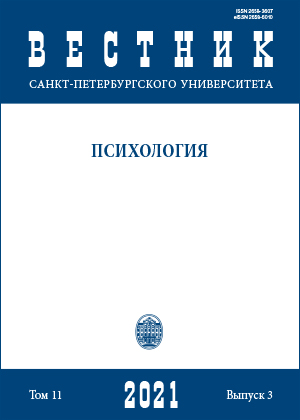Psychological well-being in young people who have been infected with COVID-19
DOI:
https://doi.org/10.21638/spbu16.2021.302Abstract
The article presents the results of a study that analyzed the features of subjective well-being and the search for sensations in young people who have been infected with the SARSa Corresponding author. Вестник СПбГУ. Психология. 2021. Т. 11. Вып. 3 235 COV-2 coronavirus (COVID-19). 62 convalescents who underwent COVID-19 (men aged 21.84 ± 4.46 years) were examined 90 days after being discharged from the hospital. The main clinical forms (CF) of COVID-19 in this study were inapparent form (20 people — 32.25 %), acute respiratory viral infection (22 people — 35.49 %) and pneumonia without respiratory failure (20 people — 32.25 %). The diagnosis of all clinical cases of COVID-19, examination, treatment and discharge of patients from the hospital were carried out in accordance with the regulatory documents. Psychodiagnostic research was carried out according to the questionnaires “Scale of subjective well-being” and “Scale of the search for sensations”. Voluntary informed consent to take part in the study was received from all participants. The indicators of subjective well-being in all groups were mainly of average values, and indicators of the desire for stimulation in all groups were generally low. The data on the correlation between the scales of methods indicate the direction of possible psycho-prophylactic work with convalescents. The article notes that self-preserving behavior today allows us to combine the psychological and somatic characteristics of the respondents, therefore, their medical and psychological support should be at the proper level in order to timely identify and stop (if necessary) postcovid syndrome.
Keywords:
young people, COVID-19, subjective well-being, the search for sensations, self-esteem of health, satisfaction with daily activities, external stimulation
Downloads
References
References
Downloads
Published
How to Cite
Issue
Section
License
Articles of "Vestnik of Saint Petersburg University. Psychology" are open access distributed under the terms of the License Agreement with Saint Petersburg State University, which permits to the authors unrestricted distribution and self-archiving free of charge.




